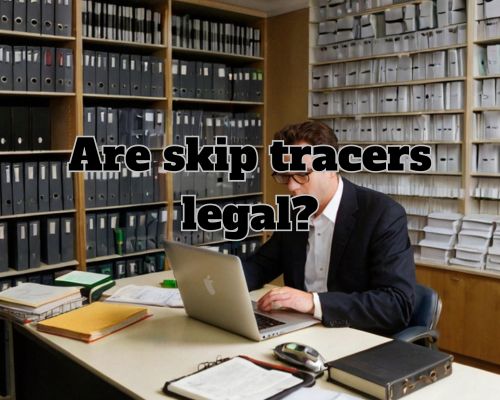
Are Skip Tracers Legal?
Understanding Their Status in the Law
Skip tracing often raises questions about legality, especially for those new to the practice or those considering its use in sensitive sectors. At its core, skip tracing involves locating individuals who are either intentionally avoiding contact or have accidentally fallen out of touch. The process itself is legal when conducted within the framework of governing privacy laws.

Skip tracers play a critical role in several fields, particularly in debt collection and law enforcement. Their work involves tracking down individuals to serve legal documents, retrieve owed payments, or locate missing persons.
To stay compliant with legal standards, it’s essential for skip tracers to respect privacy laws and avoid unlawful activities such as deception or unauthorized access to private information.
When executed properly, skip tracing is a valuable tool for businesses and legal entities. Real estate firms, in particular, leverage skip tracing methods to gather vital contact information for prospective clients, often employing advanced techniques and tools.
Understanding the rules that govern skip tracing activities ensures that you can benefit from its potential while staying on the right side of the law.
Legality and Compliance of Skip Tracing
Skip tracing is a useful tool in recovering debts or locating individuals, but it must adhere to strict legal standards. Understanding relevant laws and maintaining ethical practices are vital for anyone involved in skip tracing. Let us get to understand more on these with Private Investigator West Palm Beach.
Understanding Skip Tracing Laws
Skip tracing is governed by various laws and regulations that ensure privacy and ethical data handling. These laws may differ by jurisdiction, but generally, they address data collection and the privacy rights of individuals.
Privacy laws, such as the Fair Credit Reporting Act (FCRA), set limitations on how you can gather and use information. The Fair Debt Collection Practices Act (FDCPA) provides additional restrictions to protect individuals from unethical debt collection practices. In Europe, the GDPR also emphasizes data protection in skip tracing activities.
To stay compliant, it’s crucial to understand these laws thoroughly and ensure your methods involve only lawful sources like public records or court records. Using unauthorized data or deceptive tactics can lead to legal repercussions.
Ethical Considerations in Skip Tracing
In skip tracing, ethical considerations are as important as legal ones. Respecting privacy rights and obtaining proper consent where necessary are vital practices. You should avoid harassment or causing distress to the individuals involved.
Ethical skip tracing emphasizes integrity and honesty. Repossession agents and skip tracing services must establish trust by maintaining transparency in their methods.
Ethical guidelines often require you to communicate truthfully with subjects when necessary.
Best practices recommend using only ethical skip tracing techniques and involving legal and ethical considerations in all actions. Always prioritize the humanity and privacy of the individuals in question to uphold the integrity of the profession.
Skip Tracing in Practice
Skip tracing involves using various methods to locate individuals who may be hard to find due to changed contact information or other reasons. The practice is significant across many fields, including debt collection and law enforcement.
Techniques and Tools for Locating Individuals
The primary techniques in skip tracing include data aggregation from multiple sources. People finders and specialized databases offer information such as property records and vehicle registration.
Online tools like phone lookup services and social media can provide leads on contact information. Verification services ensure the data collected is accurate and up-to-date.
You might use skip tracing software for batch tracing, making it efficient to scan multiple records simultaneously.
Fieldwork is also crucial. Surveillance and interviews with neighbors or acquaintances can offer valuable insights. Accessing utility bills or conducting criminal background checks may require permission but can be instrumental for verification. For any skip tracing work, you may refer to Private Investigator West Palm Beach.
Applications of Skip Tracing
Skip tracing is widely used in debt recovery by collection agencies. They rely on tracing to locate individuals with outstanding debts.
Bounty hunters and bail bondsmen also use this method to find individuals who have evaded legal custody.
In real estate, investors may use skip tracing to track down owners of distressed properties. Meanwhile, journalists might employ these tools to investigate stories.
Insurance companies use skip tracing for claims verification. Legal professionals, including process servers, find skip tracing invaluable for delivering legal documents to individuals who are evasive.
Skip tracing is vital in helping private investigators and law enforcement locate missing persons as well.